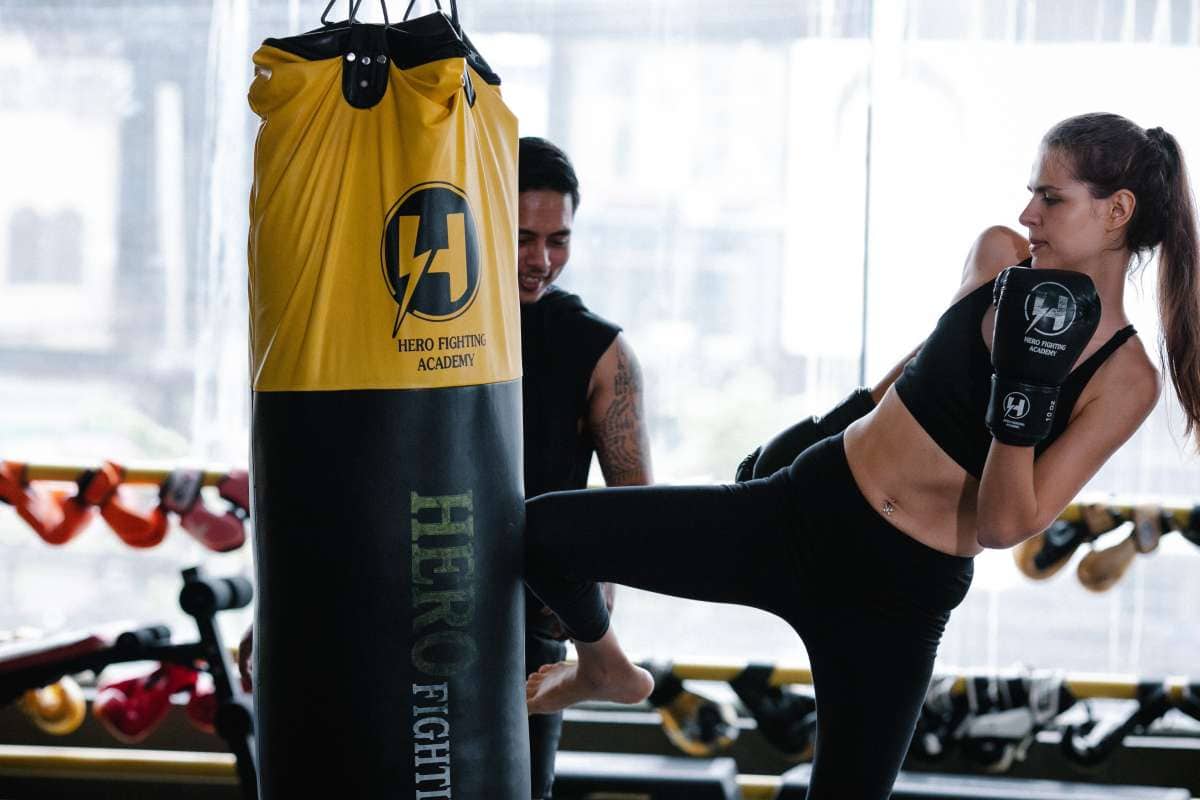When it comes to getting in shape, there are many different options out there. You can go to the gym, take kickboxing classes, or even do your own thing at home. So which one is the best? And is one better than the other? Let's look at the pros and cons of each option and see what works best for you.
Boxing FAQs
The first thing a beginner boxer needs to learn is how to block. Blocking is the easiest way to stay in punching range without getting hurt. And for beginners, blocking is the safest way because it closes off the punching angles.
So, can boxing be self-taught? Boxing can be self-taught but it's not the quickest and most effective way to become better at the sport because you aren't able to tap into the knowledge of a boxing coach who would be able to help you one to one.
Endurance is a bigger factor in boxing than most other sports because of the psychological factor involved. Fighting can make you nervous and feel tired faster than you. Getting in shape is the easy part. Train 5 days a week for a year straight and you'll be on par with the average amateur boxer.
For boxers, strong core muscles aren't just a way to get noticed by fans. Strengthening such muscles as your abs and obliques helps protect your organs and absorb part of the impact from body shots.
What's the point of voluntarily taking a beating? Here's one payoff: Boxers, MMA fighters, and other martial arts athletes do it during training because getting walloped is part of their job, and they need to practice absorbing the blow, says exercise physiologist and personal trainer Tom Holland.
What Are The Benefits Of Kickboxing?
Kickboxing is a form of martial art that involves punching, kicking, and footwork. The sport incorporates moves from other types of martial arts, such as karate and boxing.
There are different types of kickboxing, each with different rules. For instance, American kickboxing uses the hands and feet to make contact, while muay allows the elbows and knees as contact points.
Non-contact kickboxing and cardio kickboxing incorporate the same footwork, kicking, and punching techniques as other types of kickboxing. Still, you direct punches and kicks at weight bags and hand pads instead of at a workout partner.
Kickboxing offers up several health benefits for people of all ages. We’ll look at these benefits next, along with tips on getting started.
Cardiovascular Health
A 2014 study showed that participating in kickboxing three days a week for one hour at a time increased maximum oxygen uptake (VO2max).
VO2max is the measurement of the maximum amount of oxygen you can use during physical activity. It’s an indicator of your cardiovascular endurance. The higher it is, the more efficiently your body gets and uses oxygen.
Muscle Strength And Balance
In the same 2014 study, participants saw improved muscle strength in upper and lower bodies.
A small study that looked at the effects of kickboxing in people with multiple sclerosis (MS) showed that kickboxing three days per week resulted in improved coordination and balance.
Though only 11 participants completed testing and training, the results of this study suggest that kickboxing may help improve reactive and anticipatory balance. This, in turn, could reduce your risk of falls as you age.
Weight Loss
It’s no secret that regular exercise can help you manage your weight.
Kickboxing provides an aerobic workout that burns calories and can help you lose weight. Research shows that elite and amateur kickboxers have more muscle mass and lower body fat percentages.
A person who weighs 155 pounds can burn 372 calories during just 30 minutes of kickboxing.
Confidence And Self-Esteem
Exercise and martial arts have been linked to improved confidence and self-esteem. Self-confidence plays an important role in kickboxing, and many studios emphasise confidence-building as part of training.
A 2010 review suggests that practising martial arts improves self-confidence in youths. Exercise, in general, has also been linked to improved self-esteem.
Better Sleep
Physical activity improves sleep, including in people with sleep disorders. There is a significant amount of evidence that getting regular exercise positively affects sleep quality and duration.
Sleep deprivation increases your risk of diseases such as cancer and heart disease. Getting enough sleep improves your mood and ability to think, increasing your energy levels.
Improved Mental Health
Martial arts, including kickboxing and other forms of exercise, have been linked to improved mental health and positive feelings.
Kickboxing involves aerobic and anaerobic exercise, both of which positively impact mood. It does this by increasing endorphins and producing changes in the part of the brain that can improve stress, anxiety, and depression.
Kickboxing Safety
Kickboxing is usually safe for most people. But as with any sport that involves whole-body movements, kickboxing can cause injuries.
A 2003 study that looked at injuries in people who participate in kickboxing for fitness found the most common injuries to be strains of the shoulders, back, hips, knees, and ankles.
If you already have injuries affecting these areas, speak to your doctor before taking up kickboxing.
It’s also good to speak to your doctor before starting any new exercise, especially if you have an underlying heart or lung condition.
Tips For Beginners
If you’re new to kickboxing, you may find the following tips helpful:
- Ease into kickboxing slowly to reduce your risk of injury.
- Consider your goals (fitness, weight loss, or competition) when choosing a kickboxing class.
- Aim to participate in kickboxing at least three days per week for one hour at a time.
- Make sure to fuel up properly beforehand and stay hydrated while working out.
Finding A-Class
Many martial arts studios and gyms offer different levels of kickboxing classes.
When looking for a kickboxing class, knowing your goals and being aware of your current physical health are important. Describe these things to potential instructors to ensure that you get what you need from your training.
It’s also a good idea to look into what gear you’ll need for kickboxing class. Some gyms may provide gear, so find out what’s included and what isn’t before shopping.
Necessary gear for kickboxing may include:
- gloves
- hand and ankle wraps
- a mouthguard
- headgear
- shin guards
Reasons We Guarantee Kickboxing Is Better Than The Gym
Gyms Are Boring
Let’s face it, going to the gym can be boring. Doing the same exercises for the same reps and sets.
Without the correct motivation, gyms can become very boring
There is no personal attention, no direction, and gyms are designed to make you fail. Their business model relies on it.
Boredom is not a problem with kickboxing. Every session is different.
The warm-up will change, the class content will change, and the techniques taught will change. Thousands of possible techniques, combinations, and exercises to master.
Plus, your instructor is there to guide and support you every step.
You will never do the same class twice, and boredom will never be an issue.
We guarantee that every session you attend will be different.
You Won’t Work As Hard At The Gym.
It’s human nature to slack off when you train alone. You may work for the first few sessions, but to achieve long term results, you need to work hard every session.
That’s where an instructor will help.
You need to turn up to kickboxing class, and your instructor will take care of the rest. They will take you further and help you work harder than you ever would alone in the gym.
The other students in your kickboxing class will help push and motivate you to perform at your best.
We guarantee that you’ll leave every class sweaty, smiling, and having worked hard.
The Gym Is Not Mentally Challenging.
Most people go to the gym, run a bit, lift a few weights and go home. This is great for your body, but it does nothing for your brain.
Kickboxing and martial arts will develop both your body and mind. The techniques and exercises used in kickboxing will help you burn calories, tone up, lose fat and develop flexibility, but they will also challenge you mentally.
There are over 1000’s techniques to master and complex strategies to learn on your journey to a black belt.
We guarantee Kickboxing will work for both your body and mind.
Stress Release
The gym is great for releasing stress from the body, but kickboxing is even better.
Why? Kickboxing is an instinctual way to release tension.
Many of you may be familiar with the feeling of being soooo stressed that you want to lash out and smash something.
Of course, we don’t, but this tension stays locked in our bodies, causing illness.
Kickboxing offers a safe physical release of this tension in a way that feels natural.
Had a terrible day at work? Been a victim of road rage? Is the kid driving you crazy? Kickboxing allows you to vent those tensions on the bags and pads (…never on another person).
We guarantee no matter how stressed you feel when you enter our Academy after your session, you’ll feel calmer and able to cope with the stresses of life.
Worthwhile Goals
You set goals at the gym, but they tend to be short term unexciting goals.
Losing five pounds is a common achievable goal, but what happens when you reach that goal? Lose another five pounds? And then what?
You can reach the same fitness goals while training in kickboxing, but why not also set a goal that will excite you?
How about getting your black belt in kickboxing?
We’ve helped people from 10 to 60 years old get their black belts. It normally takes 3 to 5 years of consistent training to achieve.
This big goal is divided into manageable short term goals by grading every few months for a new belt.
It takes discipline, patience and dedication to earn your kickboxing black belt, and many instructors brag about how few people they’ve promoted to black belt.
However, we specialise in guiding people safely through the journey from novice to black belt.
We’re so good at this that we have graded over 50 people like you to black belt and beyond.
And at the same time you will lose weight, get in the best shape of your life and have lots of fun.
Now that’s a worthwhile goal!
We will guarantee to help you reach your Black Belt and beyond.
What Are The Main Pros And Cons Of Kickboxing
The Pros Of Kickboxing
Reduced Stress Levels
Sometimes we need to release our anger in a physical form. Anger can build up and become toxic if left unchecked, so why not do something creative- like taking up kickboxing?
It releases endorphins which make you feel good about yourself as well. When you feel good, naturally, your stress levels decrease.
Boosts Confidence And Self-Esteem
Kickboxing training helps build self-confidence and develops a more positive outlook on life. In kickboxing, instructors emphasise building confidence in students because it’s an integral part of the sport.
Weight Loss
If you’re looking to lose weight, kickboxing might be the perfect workout. It provides an aerobic session that burns calories and helps people with more muscle mass than their bodies typically contain. Kickboxers also have lower percentages of body fat.
The calories you burn in a kickboxing workout depend on the type and length of your class. For example, 135 pounds burns 350 – 450 calories in 50 minutes of kickboxing while doing curls with an estimated 150-pound weight at bodyweight. Of course, the exact number will also vary depending on whether hitting a punching bag or not.
Increased Coordination
You’ll be making some great moves in a kickboxing class that will push your coordination skills. For example, you could stand on one leg as you kick the other up into the air, swing a hook across your body, or shuffle side-by-side while punching an imaginary speed bag. All these will improve balance and flexibility.
Better Sleep
Kickboxing is the perfect solution for a tired mind and body. However, it’s true that getting regular exercise, like kickboxing exercises, will make you fall asleep faster with better quality sleep over time.
A lack of sleep can increase your risk of cancer, heart disease, and mood swings. Getting enough rest improves physical well-being with increased energy levels while improving cognitive abilities. This may include thinking clearly -which is essential in this day and age where everything seems so fast-paced.
Ameliorates Mental Health
When done regularly, kickboxing can help make you feel better no matter how bad you feel. The kickboxing exercises are linked to improved mental health and positive feelings because they increase endorphins which produce changes in the brain that allow for stress reduction or even alleviation of symptoms associated with depression and anxiety disorders.
Better Posture
Kickboxing is not just a great fitness routine for those who sit at desks all day. It’s also an excellent way to tone and strengthen your abs, often neglected during traditional workouts because you need stability to execute each move carefully.
Your abdominal wall gets targeted because it needs to support your balance and execute each move with care for accuracy; this improves posture.
Energy Boost
Kickboxing is an exhilarating high-energy cardio routine that will boost your body and mind as you breathe hard while sweating out toxins. It’s the perfect way to get back on track after working up some sweat for it all to be worth it. In addition, this whole process will improve the energy level in your body.
Perfect Cross-Training Workout
Kickboxing is an excellent workout for those looking to mix things up from their routine. You can add weights by wearing wrist or ankle bands and lightweight gloves if you want extra resistance.
Just two sessions per week will give any person new motivation to break out of that boring fitness rut they may be falling into without fail every time.
The Cons Of Kickboxing
Kickboxing workouts can be exciting, but they also come with risks. Participants need to take care because the chance of injury is not zero, and there could be any number of different causes, such as:
- The use of improper form
- Excessive intensity or speed
- Too fast kickboxing class music (above 140 beats per minute)
- Significant exercise frequency- can be more than four times per week.
Kickboxing is an excellent form of exercise, but it can be challenging a tough learning curve for some individuals who prefer self-driven workouts.
The classes are more organised and have instructors who lead others around them, so you can’t work out on your terms as some other firms do. For instance, running or biking allows for greater independence in training sessions, leaving you to do what you desire.
Conclusion
So, is kickboxing better than the gym? In short, yes. But there are a few things to keep in mind before making the switch. First and foremost, kickboxing offers an unparalleled sense of community – everyone at the studio is working toward the same goal and cheering each other on. Plus, you get all of the benefits of a great cardio workout without the monotony of treadmill running or elliptical machines. That said, it’s important to find a quality studio with certified instructors who can help ensure that you stay safe and achieve your fitness goals. Have you tried kickboxing yet? If not, what are you waiting for?



